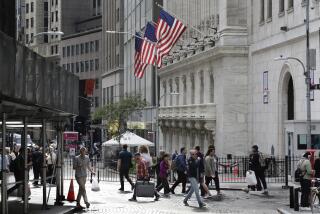Oil Prices Surge After Saudi Attack
- Share via
Oil prices soared above $42 a barrel for the first time Tuesday as a weekend of deadly terrorism in Saudi Arabia fanned fears about the security of production facilities in the world’s largest oil-exporting nation.
That added to a long list of factors that have sent oil and gasoline prices surging just as the busy driving season has arrived in the United States.
The average price for self-serve regular gasoline in California inched up three-tenths of a cent during the last week to a record $2.327 a gallon, according to a survey by the Energy Department’s Energy Information Administration.
That was a much smaller increase than the 5.5-cent leap the week before. And the nationwide average fell in the latest week, by 1.3 cents to $2.051 a gallon, as did gasoline futures prices, moving down from a record high of $1.458 a gallon May 24.
But on Tuesday, gasoline futures prices turned up again in tandem with oil prices, with regular gasoline for July delivery jumping 6.55 cents, to $1.353 a gallon, on the New York Mercantile Exchange.
Crude oil for July delivery on the Nymex shot up $2.45, or 6%, to $42.33 a barrel, its highest level since oil futures began trading on the exchange 21 years ago. Oil has now skyrocketed nearly $10 a barrel, or 30%, this year. The previous closing high for oil futures, $41.72, also occurred May 24.
After adjusting for inflation, oil prices remain lower than they were two decades ago. A barrel that cost $40 in 1981 would cost about double that amount in today’s dollars.
Regardless, even Saudi Arabia is eager to arrest the rise in oil prices before it significantly damages world economies and thus future oil demand.
Saudi Arabia and the 10 other members of the Organization of the Petroleum Exporting Countries are preparing to meet Thursday in Beirut. Led by the Saudis, OPEC is expected to increase production in a bid to boost world supplies and drive market prices back down.
Saudi Oil Minister Ali Ibrahim Naimi, arriving in Beirut, reiterated that he would push for the cartel to boost its output ceiling by 2.5 million barrels a day, or 11%. OPEC, which produces about a third of the world’s oil, will “do its best to make the fundamentals right” between oil supplies and demand, he said, adding that Saudi oil facilities were safe.
Some analysts said the so-called terrorism risk premium -- which they estimate already has added several dollars to the price of a 42-gallon barrel of oil -- was overshadowing the prospects of more supplies and could delay any drop in prices.
“Until that [additional] oil makes it on to the market and pushes inventory levels up to a much higher point, the market is going to be susceptible to these terrorist events,” said Bruce Schwartz, an energy analyst with Standard & Poor’s in New York.
Longer term, some OPEC members are calling for the group’s targeted price range for oil, currently $22 to $28 a barrel, to be raised closer to the $30 level. If that happens, oil could remain at relatively high prices even if OPEC first brings prices down a bit from their current heights.
But “we get the distinct sense that only a very few countries are pushing for a formal hike in the target range, and Saudi Arabia is not one of them,” analyst Michael Rothman of Merrill Lynch & Co. said in a note to clients Tuesday.
Terrorist attacks on an oil-industry office complex and other oil-related targets in the Saudi town of Khobar left 22 people dead this weekend, including several foreign workers. It was the second such attack in Saudi Arabia in the last month.
Other factors keeping prices high include relatively low inventories of oil worldwide; climbing demand for fuel in the U.S., China and some other countries; earlier efforts by OPEC to keep supplies in check to avoid a sharp drop in oil prices; and concerns that the U.S. plan to hand over control of Iraq to an Iraqi government on June 30 could lead to a disruption of the country’s oil production.
Some OPEC ministers in Beirut said Saudi Arabia’s oil infrastructure remains intact, and they said all OPEC members were stepping up security of their facilities. U.S. Secretary of State Colin Powell also said Tuesday that Saudi Arabia’s production was secure.
“I have confidence in the ability of the Saudi Arabians to continue to provide a secure flow of oil products,” Powell said.
Meanwhile, ChevronTexaco Corp. and ConocoPhillips said they would not delay their joint venture’s proposal for a $1.1-billion chemical-plant project in Saudi Arabia despite the weekend terrorist attacks. “Our plans are to proceed,” said Stan Sehested, a spokesman for the venture, Chevron Phillips Chemical Co.
Stocks of the major oil refiners and oil-services providers rose with crude prices Tuesday. ChevronTexaco gained 90 cents to $91.30 a share, Exxon Mobil Corp. climbed 45 cents to $43.70, and Unocal Corp. rose 31 cents to $35.94.
Associated Press was used in compiling this report.
More to Read
Sign up for Essential California
The most important California stories and recommendations in your inbox every morning.
You may occasionally receive promotional content from the Los Angeles Times.














